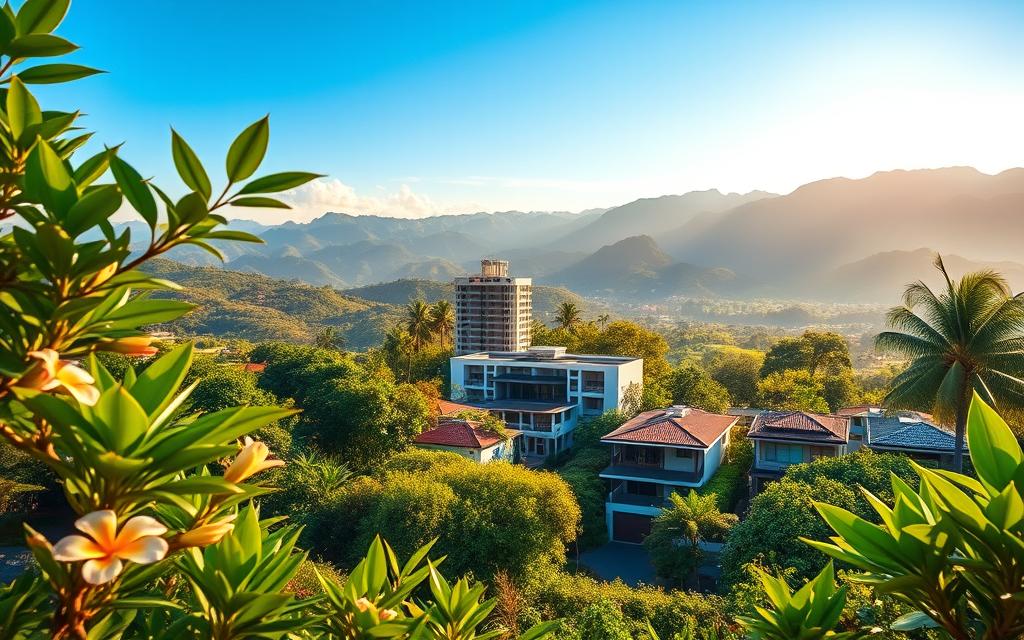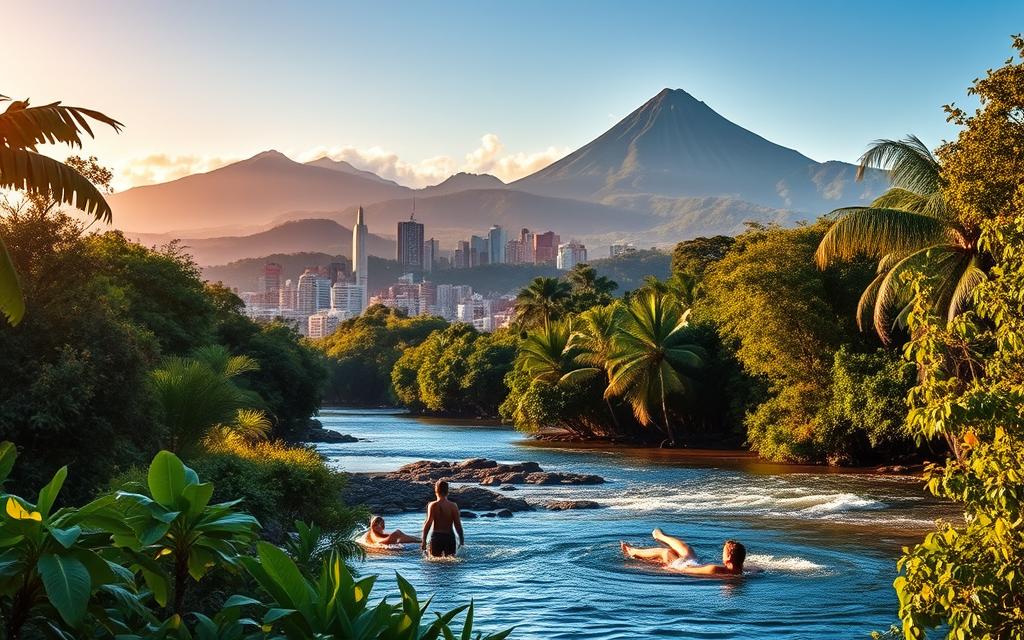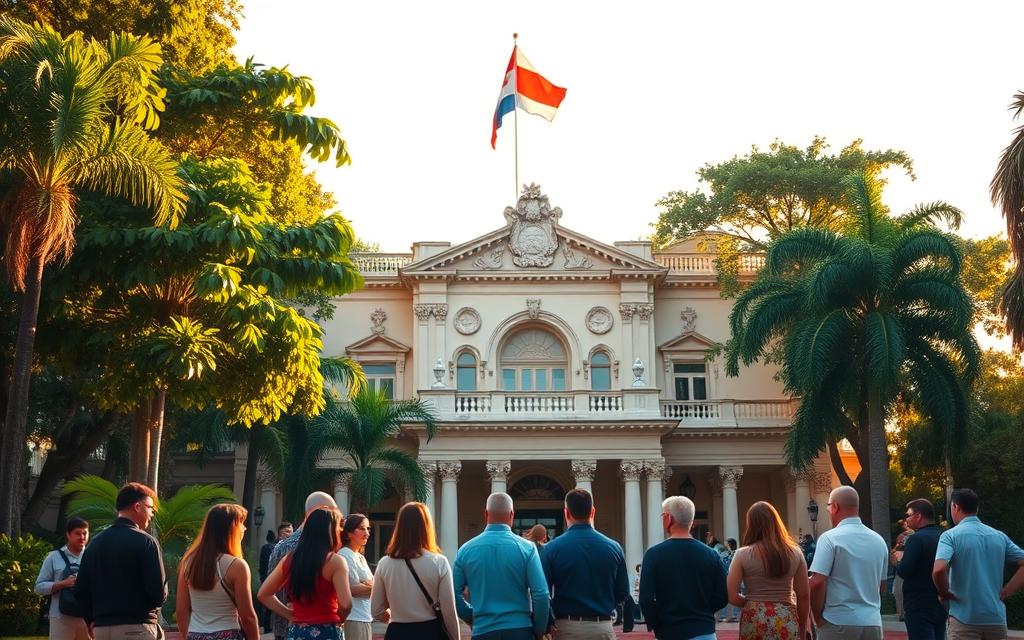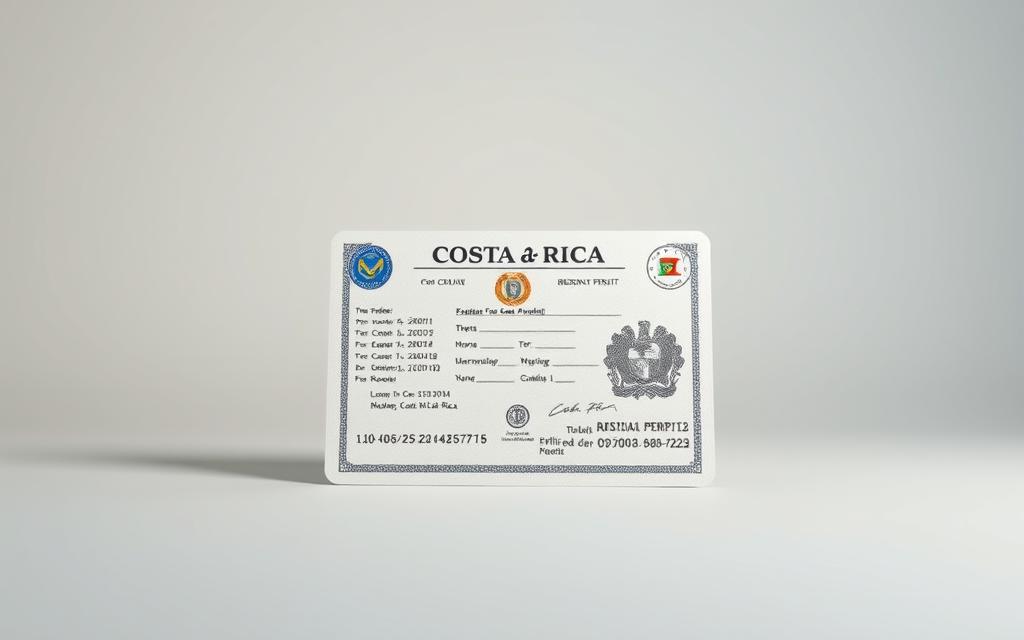Can I Work in Government Jobs with Costa Rica Citizenship?

Did you know that Costa Rica ranks as one of the happiest countries in the world? This Central American gem is known for its stunning landscapes, mild climate, and welcoming culture. For many, it’s a dream destination to call home.
Residency in Costa Rica offers a unique opportunity to improve quality of life. Families and individuals can enjoy access to quality healthcare, robust legal systems, and extensive immigration support through organizations like CRIE. The country’s natural beauty and rich culture make it an ideal place to settle.
Whether you’re exploring immigration options or considering long-term plans, Costa Rica provides diverse pathways. From temporary permits to permanent residency, the process is designed to be accessible and rewarding. Let’s dive into the details of how this vibrant country can become your new home.
Introduction: Exploring Life in Costa Rica and Its Opportunities

Living in Costa Rica opens doors to a lifestyle filled with opportunities and tranquility. This Central American nation is celebrated for its cultural richness, stable society, and welcoming environment. Families and individuals alike find it an ideal place to build a fulfilling life.
Understanding the requirements for residency and citizenship is key to unlocking these benefits. By meeting legal criteria, individuals gain access to quality healthcare, education, and social services. Costa Rica’s robust immigration system ensures a smooth process for newcomers.
Our guide will walk you through the step-by-step processes of obtaining residency and citizenship. We’ll also explore the advantages of becoming a citizen, from enhanced legal rights to greater integration into the community. A clean record and proper documentation are essential for success.
Let’s explore the possibilities together. Whether you’re seeking a new home or professional opportunities, Costa Rica offers a pathway to a brighter future. Join us as we delve into the details of this vibrant country’s immigration system.
Costa Rican Residency: A Gateway to a Better Quality of Life

Costa Rica’s residency programs are designed to offer stability and growth for expats. The process is straightforward, making it accessible for those seeking a new home. By following each step, individuals can unlock the benefits of living in this vibrant country.
Temporary and permanent residency options cater to diverse needs. Temporary permits are ideal for those testing the waters, while permanent status provides long-term security. Both pathways lead to access to healthcare, education, and social services.
The country’s residency system has a proven track record of success. Many expats transition from temporary to permanent status, eventually gaining citizenship. This progression opens doors to broader social and professional opportunities.
Residency in Costa Rica is more than a legal status. It’s a gateway to a lifestyle filled with natural beauty, cultural richness, and community support. Whether you’re seeking personal growth or professional advancement, the process is designed to help you thrive.
Diverse Immigration Options in Costa Rica

Costa Rica’s immigration system offers tailored pathways for diverse needs. Whether you’re seeking financial stability or a new lifestyle, the country provides clear routes to residency and citizenship. Understanding these options is the first step toward building a future in this vibrant nation.
Understanding Rentista, Pensionado, and Investment Pathways
The Rentista pathway is ideal for those with steady income. Applicants must prove a monthly income of $2,500 USD or deposit $60,000 USD in a local bank. This option ensures financial stability while allowing access to Costa Rica’s benefits.
For retirees, the Pensionado program requires a minimum monthly pension of $1,000 USD. This pathway is perfect for those looking to enjoy their golden years in a peaceful, tropical setting.
Investors can qualify by committing at least $150,000 USD to local businesses or property. This route not only grants residency but also supports the country’s economy.
Evaluating Your Financial and Lifestyle Needs
Choosing the right immigration option depends on your financial situation and goals. The Rentista pathway suits those with reliable income, while Pensionado is tailored for retirees. Investors can leverage their capital to secure residency and contribute to the local economy.
Obtaining a visa is the first step in any immigration process. Each pathway has specific requirements, but all lead to residency and, eventually, citizenship. Evaluating your needs helps determine the best fit for your aspirations.
We guide you through each step, ensuring a smooth transition to life in Costa Rica. Whether you’re drawn by the country’s natural beauty or its welcoming culture, the right pathway awaits.
Temporary vs Permanent Residency in Costa Rica

Understanding the differences between temporary and permanent residency is crucial for planning your future in Costa Rica. Both options offer unique benefits, but they cater to different needs and timelines. Let’s explore the key distinctions and how to transition between them.
Key Differences and Transition Steps
Temporary residency serves as an initial step toward long-term stability. It allows individuals to live in the country for a specific period, typically one to two years. During this phase, a work permit is often granted, enabling employment opportunities. However, these permits may have limitations depending on the type of visa.
Transitioning to permanent residency usually requires fulfilling a set number of years, often three. This status provides increased rights, such as access to healthcare and education, along with long-term security. Permanent residency must be renewed every five years, ensuring continued legal status.
Planning your career and life effectively involves understanding the specific conditions of your permit. Whether you’re aiming for temporary or permanent status, knowing the requirements helps streamline the process. For more details on residency options, visit our guide on how to get residency in Costa.
Rentista, Pensionado, and Investment Residency Pathways

Costa Rica offers tailored residency pathways for individuals seeking stability and growth. Each option, whether Rentista, Pensionado, or Investment, has specific documentation requirements that pave the way to permanent residency and citizenship.
The Rentista pathway is ideal for those with a steady income. Applicants must provide proof of a monthly income of $2,500 or deposit $60,000 in a local bank. This document ensures financial stability while opening doors to the country’s benefits.
For retirees, the Pensionado program requires a minimum monthly pension of $1,000. This pathway offers a peaceful lifestyle, supported by Costa Rica’s healthcare and social services. Proper documentation, including proof of pension, is essential for approval.
Investors can secure residency by committing at least $150,000 to local businesses or property. This route not only grants residency but also contributes to the local economy. Detailed investment records are crucial for a successful application.
Each pathway requires specific documents, such as proof of income, bank statements, or investment records. Gathering these early in the process ensures a smooth transition to permanent residency. Expert consultation can further simplify the journey.
Ultimately, these pathways lead to the status of a Costa Rican citizen. By fulfilling the requirements and maintaining a clean record, individuals can fully integrate into the community and enjoy the country’s benefits.
Navigating the Work Permit and Visa Process
Securing a work permit and visa in Costa Rica is a straightforward process when you have the right information. Whether you’re a temporary resident or planning to stay long-term, understanding the steps and requirements ensures a smooth transition to legal employment.
Required Documentation and Application Steps
To begin the process, gather essential documents such as a valid passport, background checks, and proof of residency status. A signed letter from your employer, acting as a guarantor, is also required. Employers must provide proof of economic solvency, including income certification by a Certified Public Accountant (CPA).
The application involves submitting these documents to the immigration authorities. Ensure all paperwork is translated into Spanish and includes eight passport-size photos. For detailed guidance, consult legal experts who specialize in Costa Rican immigration.
Understanding Processing Times and Requirements
Processing times for work permits and visas can vary. Temporary permits typically take a few weeks, while permanent residency applications may extend up to a year. During this period, applicants can legally stay in the country with a “Hoja trámite” certificate.
To avoid delays, double-check all documents for accuracy. Common pitfalls include incomplete forms or missing translations. Staying informed about the latest requirements and seeking professional assistance can significantly speed up the process.
By following these steps and gathering the necessary information, you can navigate the work permit and visa process with confidence. Costa Rica’s welcoming environment and streamlined procedures make it easier to achieve your employment goals.
Can I work in government jobs with Costa Rica citizenship?
Costa Rica’s public sector offers diverse opportunities for those with legal residency. Understanding the requirements is essential for securing roles in public services. Legal documentation and proof of stable income are key factors in determining eligibility.
Different immigration types influence access to public sector positions. Temporary and permanent residency statuses each have specific conditions. Applicants must provide verified income records to meet financial criteria.
Income verification ensures financial stability, a critical requirement for public service roles. Legal status, whether temporary or permanent, must align with the position’s requirements. Expert guidance can simplify navigating these regulations.
By fulfilling these conditions, individuals can explore opportunities in public institutions. Proper documentation and compliance with legal standards are essential for success. Costa Rica’s welcoming environment makes it easier to achieve these goals.
Eligibility and Legal Requirements for Government Positions
Securing a role in public service requires meeting specific legal and eligibility criteria. These standards ensure that only qualified individuals contribute to the country’s governance. Understanding these requirements is the first step toward building a career in public institutions.
Background Checks and Clean Record Criteria
Strict background checks are mandatory for anyone applying for public service roles. A clean record demonstrates integrity and trustworthiness, essential qualities for government positions. Applicants must provide verified documentation, including criminal history reports.
Prior experience with immigration processes can streamline applications. Familiarity with legal systems and documentation often gives candidates an edge. Maintaining a spotless record throughout your stay is crucial for eligibility.
Proof of Legal Residency and Work Permits
Legal residency and valid work permits are non-negotiable requirements. Applicants must submit proof of their status, such as residency cards or permit details. These documents confirm your right to live and work in the country.
Processing times for permits can vary, so planning ahead is essential. Temporary permits may take a few weeks, while permanent status can extend up to a year. Ensuring all paperwork is accurate and complete avoids unnecessary delays.
Each eligibility criterion is rigorously enforced to maintain public trust. By fulfilling these requirements, individuals can explore opportunities in public institutions. Proper documentation and compliance with legal standards are essential for success.
Step-by-Step Guide to Securing Government Employment
Securing a role in public institutions requires careful planning and adherence to legal guidelines. The process involves multiple stages, from preparing your application to acing the interview. Understanding the legal frameworks and timelines ensures a smooth journey toward your goal.
Public sector positions often require a minimum residency period of three years. This timeframe allows applicants to establish stability and familiarity with local systems. Meeting this requirement is a critical step in qualifying for permanent roles.
Preparing Your Application
Start by gathering all necessary documents, including proof of residency, background checks, and income verification. Ensure all paperwork is translated into Spanish and meets legal standards. Proper preparation minimizes delays and increases your chances of success.
Double-check each document for accuracy. Incomplete or incorrect submissions can lead to extended processing times. Seeking expert advice can help navigate complex requirements and streamline the process.
Interview and Evaluation Process
Once your application is submitted, the evaluation phase begins. This stage includes interviews and assessments to determine your suitability for the role. Prepare thoroughly by researching the institution and practicing common interview questions.
Understanding the law and legal expectations is crucial during this phase. Demonstrating your knowledge and commitment to public service can set you apart from other candidates. Stay patient, as this process can take several months.
By following these steps and adhering to legal guidelines, you can successfully secure a position in public institutions. Proper planning and attention to detail are key to achieving your career goals in Costa Rica.
Essential Documentation for a Successful Application
Preparing the right documents is the most effective way to ensure a smooth application process for public roles. Proper documentation acts as a bridge, connecting applicants to their goals in the public sector. It’s not just about meeting legal standards; it’s about demonstrating your readiness to contribute.
Key documents include proof of identity, such as a valid passport or national ID. Certified copies of these documents are essential to verify authenticity. Additionally, applicants must provide clear evidence of residency, like a residency card or utility bills. These documents confirm your legal status and stability in the country.
Translations play a crucial role in the process. All documents must be in Spanish or officially translated to meet local requirements. This step ensures that your application is easily understood by authorities. Attention to detail here can significantly reduce processing times.
Proof of financial stability is another critical component. This includes bank statements, income verification, or investment records. These documents show your ability to support yourself while contributing to the public service. They also highlight your commitment to long-term integration.
Proper documentation is more than a requirement; it’s a service tool that simplifies the application process. By organizing your paperwork effectively, you pave the way for success. This approach not only meets legal standards but also demonstrates your dedication to securing a role in public institutions.
Ultimately, these documents act as a foundation for building a stable home in the public sector. They ensure that you meet all criteria while showcasing your readiness to contribute. With the right preparation, you can navigate the process with confidence and ease.
Leveraging Expert Consultation for Immigration Success
Navigating the immigration process can be complex, but expert guidance makes it manageable. Professional consultation plays a vital role in ensuring every condition is met for securing residency in Costa Rica. With over 20 years of experience, organizations like CRIE have helped thousands achieve their goals.
Expert advice covers every part of the process, from document review to legal consultation. This ensures that applications are accurate and complete, reducing the risk of delays. By partnering with professionals, applicants can focus on their transition while experts handle the details.
CRIE’s services include tailored strategies for meeting residency requirements. Whether it’s temporary or permanent residency, their team provides the support needed to navigate complex conditions. This level of assistance simplifies the process, making it accessible for everyone.
We encourage readers to consider professional help as a key component of their immigration journey. With the right guidance, securing residency in Costa Rica becomes a seamless experience. Expert consultation ensures that every step is handled with precision and care.
Building a Career in Costa Rican Public Service
Building a career in public service in Costa Rica offers a unique blend of stability and community impact. For those with residency, this sector provides rewarding opportunities to contribute meaningfully while advancing professionally. Effective networking and local integration are essential steps to thriving in these roles.
Residency in Costa Rica opens doors to diverse public service opportunities. Whether in healthcare, education, or administration, these roles require a strong understanding of local systems. Proper integration into the community ensures smoother transitions and greater success in securing positions.
Networking and Local Integration Tips
Establishing connections with local government officials and community organizations is crucial. Attend public events, join professional groups, and participate in community initiatives. These activities not only build relationships but also demonstrate your commitment to the community.
Formal training and certifications can enhance your qualifications. Costa Rica’s emphasis on education and healthcare creates demand for skilled professionals. Investing in relevant training ensures you meet the criteria for public service roles.
Effective communication is key during the transition period. Learning Spanish and understanding cultural nuances fosters better integration. This effort not only improves your professional prospects but also enriches your personal experience in Costa Rica.
By combining networking, training, and cultural adaptation, you can build a thriving career in public service. Costa Rica’s welcoming environment and robust systems make it an ideal place to achieve your professional goals.
Practical Tips for Transitioning to Life in Costa Rica
Transitioning to life in Costa Rica involves embracing new cultural and financial realities. For expats, this journey can be both exciting and challenging. By understanding the local lifestyle and preparing effectively, you can make the most of your experience.
Adapting to Cultural and Financial Changes
Embracing the “Pura Vida” mindset is key to thriving in Costa Rica. This philosophy emphasizes simplicity, gratitude, and enjoying life’s moments. Expats often find that adopting this attitude helps them connect with locals and feel more at home.
Financial adjustments are another important aspect. The local currency, the colón, and the cost of living may differ from what you’re used to. Budgeting wisely and understanding local expenses, such as groceries and utilities, ensures a smooth transition.
Job opportunities for expats vary across sectors. Networking with local professionals and leveraging online platforms can help you find suitable roles. Teaching English, for example, is a popular option that offers competitive pay.
Community integration is essential for long-term success. Participating in local events, learning Spanish, and building relationships with neighbors fosters a sense of belonging. These efforts not only enrich your personal life but also open doors to professional opportunities.
For those considering residency in Costa Rica, these tips can make the transition smoother. By embracing the culture, managing finances, and building connections, you can create a fulfilling life in this vibrant country.
Understanding Costa Rican Citizenship and Its Benefits
Gaining citizenship in Costa Rica unlocks a world of opportunities and benefits. It provides access to improved employment prospects, better public services, and a higher quality of life. For those seeking stability and integration, citizenship is a significant step forward.
One of the key advantages is enhanced access to social and economic services. Citizens enjoy universal healthcare, free public education, and other public benefits. These services contribute to a stable and fulfilling lifestyle, making it easier to thrive in the country.
Proof of citizenship plays a crucial role in unlocking these benefits. Proper documentation, such as a valid passport or national ID, ensures eligibility for public programs. It also simplifies processes like property ownership and accessing financial services.
Citizenship also strengthens connections to both local and international marketplaces. It opens doors to broader employment opportunities and facilitates easier travel. With visa-free access to over 150 countries, citizens can explore global opportunities with ease.
Compared to temporary residency, citizenship offers greater job security and eligibility for public roles. It eliminates the need for frequent renewals and provides long-term stability. For those committed to building a life in Costa Rica, citizenship is the ultimate goal.
For more details on the process, explore the Costa Rica dual citizenship requirements. This resource provides valuable insights into meeting the criteria and enjoying the full benefits of citizenship.
Strategies for Overcoming Application Challenges
Navigating the application process in Costa Rica can present unique challenges, but with the right strategies, success is within reach. Many applicants encounter delays, documentation errors, or fee-related issues. By addressing these hurdles proactively, you can streamline your journey toward residency or citizenship.
Troubleshooting Common Hurdles
One of the most frequent challenges is managing application fees. These costs can add up, especially for temporary residents. Budgeting in advance and understanding the fee structure helps avoid financial stress. Additionally, temporary residents often face compliance issues, such as renewing permits on time. Staying organized and setting reminders ensures you meet all deadlines.
Documentation errors are another common obstacle. Missing or incorrect paperwork can delay your application significantly. Double-checking all forms and seeking expert advice minimizes these risks. Translations of documents into Spanish are often required, so working with certified translators is essential.
Time management is crucial during the application process. Delays can occur due to high demand or administrative backlogs. Planning ahead and setting realistic expectations helps reduce frustration. Persistence is key; even if challenges arise, staying focused on your goals ensures progress.
Expert consultation can make a significant difference. Professionals with experience in Costa Rica’s immigration system provide valuable insights and support. They help navigate complex requirements, ensuring your application is complete and accurate. For more tips on managing the process, visit our guide on what to do after getting residency.
By addressing these challenges with a proactive approach, you can simplify the application process. Whether you’re a temporary resident or pursuing permanent status, these strategies pave the way for a smoother experience. With persistence and the right support, your goals in Costa Rica are within reach.
Conclusion
Embarking on the journey to secure your status in Costa Rica opens doors to a brighter future. This guide has outlined the essential steps, from obtaining temporary residency to exploring employment opportunities. Each section provides valuable insights to ensure a seamless transition.
Residency is more than a legal status; it’s an opportunity to build a stable and fulfilling life. By understanding the process and meeting the requirements, individuals can unlock access to healthcare, education, and public services. Temporary residency serves as the first step toward long-term stability and integration.
Expert consultation plays a vital role in navigating this journey. Organizations like CRIE offer tailored support, ensuring every condition is met for a successful application. Their guidance simplifies the process, allowing you to focus on building your future.
Take the next step today. Consult with trusted experts to begin your journey toward a thriving life in Costa Rica. The opportunities are waiting—seize them now.


